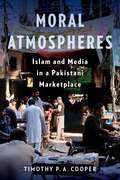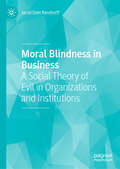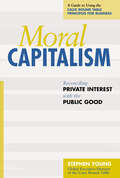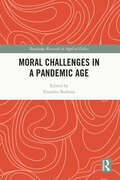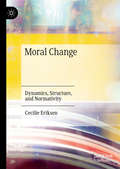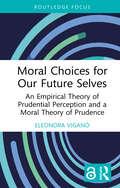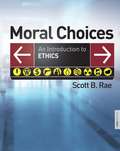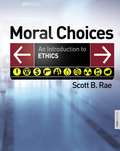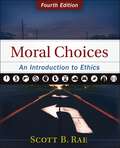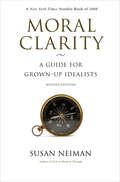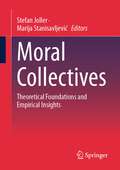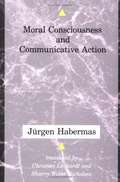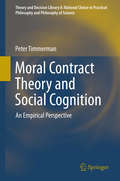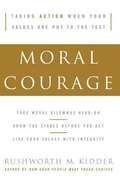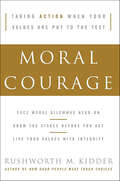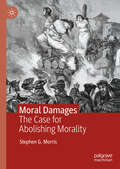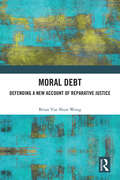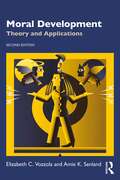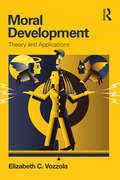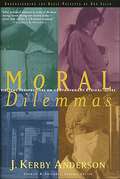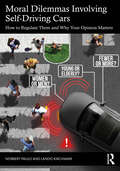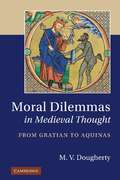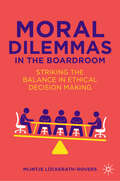- Table View
- List View
Moral Atmospheres: Islam and Media in a Pakistani Marketplace (Religion, Culture, and Public Life #51)
by Timothy P. CooperLahore’s Hall Road is the largest electronics market in Pakistan. Once the center of film and media piracy in South Asia, it now specializes in smartphones and accessories. For Hall Road’s traders, conflicts between the economic promises and the moral dangers of film loom large. To reconcile their secular trade with their responsibilities as devoted Muslims, they often look to adjudicate the good or bad moral “atmosphere” (mahaul) that can cling to film and media.Timothy P. A. Cooper examines the diverse and coexisting moral atmospheres that surround media in Pakistan, tracing public understandings of ethical life and showing how they influence economic behavior. Drawing on extensive ethnographic work among traders, consumers, collectors, archivists, cinephiles, and cinephobes, Moral Atmospheres explores varied views on what the relationship between film and faith should look, sound, and feel like for Pakistan’s Muslim-majority public. Cooper considers the preservation and censorship of film in and outside of the state bureaucracy, contestations surrounding heritage and urban infrastructure, and the production and circulation of sound and video recordings among the country’s religious minorities. He argues that a focus on atmosphere provides ways of seeing moral thresholds as mutable and affective, rather than as fixed ethical standpoints. At once a vivid ethnography of a market street and a generative theorization of atmosphere, this book offers fresh perspectives on moral experience and the relationship between religion and media.
Moral Blindness in Business: A Social Theory of Evil in Organizations and Institutions
by Jacob Dahl RendtorffIn this book, Jacob Dahl Rendtorff investigates moral blindness in business and public administration based on Hannah Arendt’s concept of banality of evil in her famous report on the Nazi-criminal Adolf Eichmann trail in Jerusalem in 1961. Moral blindness and evil in management is instrumental wrongdoing inflicted upon human beings as a violation of their dignity and humanity. Organizational evil in business, bureaucracies and public administration is analysed with focus on obedience to authority and systemic role conformity of managers and administrators. This includes the critical question about how concepts of banality of evil and moral blindness can explain ethical insensibility and lack of moral understanding in business and administration. Rendtorff proposes a humanistic vision of management and ethical leadership. Moral thinking, responsibility and moral judgment is essential in management and governance in business and administration. This book is a must-read for academics and practitioners studying and working in philosophy of management, business ethics, political philosophy, administration ethics and corporate social responsibility.
Moral Capitalism: Reconciling Private Interest with the Public Good
by Stephen YoungShows how to ensure that capitalism promotes progress and equality rather than enriching the few at the expense of many Based on principles developed by the Caux Round Table, an international network of senior business executives from such companies as 3M, Canon, NEC, Bankers Trust, Shell, Prudential, and dozens of other companies Provides practical guidelines for corporate social responsibility through the Caux Round Table's Seven General Principles for Business The world is drifting without a clear plan for its economic development. Communism is dead, but in the wake of Enron and similar scandals, many see capitalism as amoral and too easily abused. A blueprint for progress is needed and Moral Capitalism provides one. Moral Capitalism is based on principles developed by the Caux Round Table, an extraordinary international network of top business executives who believe that business can-and must-weigh both profit and principle. Caux Round Table's global chair, Stephen Young, argues that the ethical standards inherent in capitalism have been compromised by cultural values inimical to capitalism's essentially egalitarian, rational spirit, and distorted by the short-sighted dog-eat-dog doctrines of social Darwinism into what he calls brute capitalism. He demonstrates how the Caux Round Table's Seven General Principles for Business can serve as a blueprint for a new moral capitalism, and explores in detail how, if guided by these principles, capitalism is really the only system with the potential to reduce global poverty and tyranny and address the needs and aspirations of individuals, societies, and nations.
Moral Certainty and the Foundations of Morality
by Neil O’HaraWhat lies at the foundation of our moral beliefs? If we dig down far enough do we find that our moral values have no ground at all to stand on, and so are apt to collapse upon serious philosophical investigation? This book seeks to answer these and related questions by positing an indubitable foundation for our moral beliefs – they arise from the phenomenon of ‘primary recognition’, and are fundamentally shaped by ‘basic moral certainties’. Drawing on philosophers such as Ludwig Wittgenstein and Knud Ejler Løgstrup, this book draws together insights from both Analytic and Continental philosophy to provide a convincing new picture of our moral foundations. And it does so in a way that eschews moral conservativism and opens the way for a rich understanding of the variety and particularity of our human moral systems, while also keeping a significant place for those moral beliefs that occur universally, across cultures.
Moral Challenges in a Pandemic Age (Routledge Research in Applied Ethics)
by Evandro BarbosaThe COVID-19 pandemic, whose consequences will be felt in the long term, can be interpreted as a signal that we have been living in a pandemic age. A pandemic is humanity's common ground, so the moral problems inherent in it are of interest to everyone from now on. It brought a set of moral challenges that cannot be ignored. This book – which emerged amid the novel coronavirus crisis – is designed to fill the gap in the current literature on the topic, offering an original approach to its moral implications. It can be taken as a guide in the face of these pandemic-age challenges for human relations. The pandemic is a multifaceted phenomenon, and its debate involves a wide variety of practical philosophical concerns. All the chapters of this book, divided into four sections, aim to clarify its central aspects, while each chapter provides an original approach to the debate’s leading issues and relies on each most significant collaborator’s expertise. Also, they reflect their unique pandemic experiences under the scrutiny of philosophical unrest. Since the pandemic is an ongoing event, Moral Challenges in a Pandemic Age will be of interest to professors, students, and researchers engaged in understanding the ethical dimension of the age we are experiencing. The problems addressed in this collection transcend the boundaries of the philosophical field, offering an innovative approach to individuals keen on discussing the pandemic from a moral point of view. Such a discussion encompasses the philosophical inquiry but is not restricted to it. Those interested in related areas such as psychology, sociology, biology, public health, education, anthropology, and cultural studies – to name a few – will find connections with parallel themes in this book. In addition, the collection brings a theoretically supported approach to several related debates in a language accessible to anyone who wants to know more about the topic.
Moral Change: Dynamics, Structure, and Normativity
by Cecilie EriksenHow does moral change happen? What leads to the overthrow or gradual transformation of moral beliefs, ideals, and values? Change is one of the most striking features of morality, yet it is poorly understood. In this book, Cecilie Eriksen provides an illuminating map of the dynamics, structure, and normativity of moral change. Through eight narratives inspired by the legal domain and in dialogue with modern moral philosophy, Eriksen discusses moral bias, conflict, progress, and revolutions. She develops a context-sensitive understanding of ethics and shows how we can harvest a knowledge of the past that will enable us to build a better future.
Moral Choices for Our Future Selves: An Empirical Theory of Prudential Perception and a Moral Theory of Prudence (Routledge Focus on Philosophy)
by Eleonora ViganòThis book investigates the relationship between our present and future selves. It focuses specifically on diachronic self-regarding decisions: choices involving our earlier and later selves, in which the earlier self makes a decision for the later self. The author connects the scientific understanding of the neurobehavioral processes at the core of individuals’ perceptions of their future selves with the philosophical reflection on individuals’ moral relationship with their future selves. She delineates a descriptive theory of the perception of the future self that is based on empirical evidence and that systematizes and integrates the current theoretical literature. She then argues for the morality of prudence and interprets diachronic self-regarding decisions as decisions between two agents— the earlier and later selves—that belong to the realm of intergenerational ethics, which regulates the relationship between contemporary people and future generations. Finally, the author provides a moral theory of prudence based on respect for one’s agency. This theory identifies what the present and the future selves owe to one another in diachronic self-regarding decisions. Moral Choices for Our Future Selves will be of interest to scholars and students working in ethics, moral psychology, philosophy of mind, and cognitive science.
Moral Choices: An Introduction to Ethics
by Scott B. RaeNow in its third edition, this foremost college ethics text helps students form a basis for practical, ethical decision making in contemporary culture. Substantial updates and revisions include a new chapter on ethics and economics, online resources for instructors, current case studies, new material on bioethics and stem cell research, and much more.
Moral Choices: An Introduction to Ethics
by Scott RaeWith its unique union of theory and application and its well-organized, easy-to-use design, Moral Choices has earned its place as the standard text for college ethics courses. This third edition offers extensive updates, revisions, and brand new material, all designed to help students develop a sound and current basis for making ethical decisions in today's complex postmodern culture. Moral Choices outlines the distinctive elements of Christian ethics while avoiding undue dogmatism. The book also introduces other ethical systems and their key proponents, including Plato, Aristotle, Augustine, Aquinas, and Kant. After describing a seven-step procedure for tackling ethical dilemmas, author Scott Rae uses case studies to help students think critically and biblically about ? Abortion ? Reproductive Technologies ? Euthanasia ? Capital Punishment ? Sexual Ethics ? The Morality of War ? Genetic Technologies and Human Cloning ? NEW: Ethics and Economics New features include online resources for instructors; a chapter covering global capitalism, environmental ethics, and business ethics; new material on bioethics and on stem cell and embryo research; discussion questions at the end of each chapter; and sidebars with case studies.
Moral Choices: An Introduction to Ethics
by Scott RaeWith its unique union of theory and application and its well-organized, easy-to-use design, Moral Choices has earned its place as the standard text for college ethics courses. This fourth edition offers extensive updates, revisions, and three brand new chapters all designed to help students develop a sound and current basis for making ethical decisions in today's complex postmodern culture.Moral Choices outlines the distinctive elements of Christian ethics while avoiding undue dogmatism. The book also introduces other ethical systems and their key historical proponents, including Plato, Aristotle, Augustine, Thomas Aquinas, and Immanuel Kant.After describing a seven-step procedure for tackling ethical dilemmas, author Scott Rae uses case studies to address some of today's most pressing social issues. He guides students in thinking critically and biblically about issues, including:AbortionReproductive TechnologiesEuthanasiaCapital PunishmentSexual EthicsThe Morality of WarGenetic Technologies and Human CloningEthics and EconomicsNEW: Creation CareNEW: Animal RightsNEW: Gun-ControlNEW: Race, Gender, and DiversityNEW: Immigration, Refugees, and Border ControlFEATURESRelevant Case Studies throughoutDiscussion questions at the end of each chapterSidebars with case studies for discussionRecommended further reading
Moral Clarity: A Guide for Grown-Up Idealists (Revised Edition)
by Susan NeimanAn inspiring and jargon-free look at how morals guide and inform our lives Moral philosopher Susan Neiman makes the tools of her trade relevant to real life inMoral Clarity, steering us clear of political dogma to offer instead a framework for forming clear opinions and taking responsible action on today’s urgent political and social questions. Neiman reaches back to the classic virtues—happiness, reason, reverence, and hope—that were held high by every Enlightenment thinker and draws on literature, evolutionary theory, and contemporary research to show that the pursuit of moral clarity is open to all who are committed to these ideals, believers and nonbelievers alike.
Moral Collectives: Theoretical Foundations and Empirical Insights
by Stefan Joller Marija StanisavljevićWhether terrorist attacks, refugee or financial crises - the challenges of globalized modernity expose those areas that Durkheim described as anomic and whose processing still illustrates the central position of moral communication. There is some evidence to suggest that progressive functional differentiation does not erode morality, but actually promotes a remoralization of society through increasing communicative networking. Wherever grievances come to light and it is not foreseeable how they could be satisfactorily resolved in the modus operandi, morality provides a promising instrument which, in the form of moral collectives, is able to permeate everyday life and shape society. In this sense, the anthology is dedicated to a theoretical as well as empirical analysis of morality, which takes shape as a genuinely social quantity via moral collectives. This book is a translation of an original German edition. The translation was done with the help of artificial intelligence (machine translation by the service DeepL.com). A subsequent human revision was done primarily in terms of content, so that the book will read stylistically differently from a conventional translation.
Moral Consciousness And Communicative Action
by Jürgen Habermas Christian Lenhardt Shierry Weber NicholsenThis long-awaited book sets out the implications of Habermas's theory of communicative action for moral theory. "Discourse ethics" attempts to reconstruct a moral point of view from which normative claims can be impartially judged. The theory of justice it develops replaces Kant's categorical imperative with a procedure of justification based on reasoned agreement among participants in practical discourse. Habermas connects communicative ethics to the theory of social action via an examination of research in the social psychology of moral and interpersonal development. He aims to show that our basic moral intuitions spring from something deeper and more universal than contingent features of our tradition, namely from normative presuppositions of social interaction that belong to the repertoire of competent agents in any society. Jürgen Habermas is Professor of Philosophy at the University of Frankfurt.
Moral Contract Theory and Social Cognition
by Peter TimmermanThis interdisciplinary work draws on research from psychology and behavioral economics to evaluate the plausibility of moral contract theory. In a compelling manner with implications for moral theory more broadly, the author's novel approach resolves a number of key contingencies in contractarianism and contractualism. Acting in accordance with principles that we could all agree to under certain conditions requires that agents are capable of taking up the perspectives of others. Research in social and developmental psychology shows just how challenging this can be. The author discusses in detail what implications findings on perspective-taking have for contract theory. He concludes with cautious optimism that, despite our limitations, it lies within our power to become better at perspective-taking and to adopt a contractarian or contractualist mode of moral thinking. This does however require us to be much more attentive to the standpoints of others than we tend to be. Contract theorists also assume that agents can be moved to comply with principles that would be the object of agreement, with some arguing they can be so moved out of their own interest. The book show that, in contrast to the suspicion of many philosophers, this idea is largely supported by research on the dynamics of trust and our ability to distinguish trustworthy from untrustworthy others. Bringing a welcome dose of realism to the debate on contract theory, the author shows the value of assessing moral theories from an empirical perspective.
Moral Courage
by Rushworth M. KidderIn a book rich with examples, Rushworth Kidder reveals that moral courage is the bridge between talking ethics and doing ethics. He explains that the courage to act is found at the intersection of three elements: action based on core values, awareness of the risks, and a willingness to endure necessary hardship. He demonstrates the benefits of ethical action to the individual and to society -- and the severe consequences that can result from remaining morally dormant.
Moral Courage
by Rushworth M. KidderWhy did a group of teenagers watch a friend die instead of putting their own reputations at risk? Why did a top White House official decide to come clean and accept a prison sentence during Watergate? Why did a finance executive turn down millions out of respect for her employer? Why are some willing to risk their futures to uphold principles? What gives us the strength to stand up for what we believe?As these questions suggest, the topic of moral courage is front and center in today's culture. Enron, Arthur Andersen, the U.S. Olympic Committee, abusive priests, cheating students, domestic violence -- all these remind us that taking ethical stands should be a higher priority in our culture. Why, when people discern wrongdoing, are they sometimes unready, unable, or unwilling to act?In a book rich with examples, Rushworth Kidder reveals that moral courage is the bridge between talking ethics and doing ethics. Defining it as a readiness to endure danger for the sake of principle, he explains that the courage to act is found at the intersection of three elements: action based on core values, awareness of the risks, and a willingness to endure necessary hardship. By exploring how moral courage spurs us to strive for core values, he demonstrates the benefits of ethical action to the individual and to society -- and the severe consequences that can result from remaining morally dormant.Moral Courage puts indispensable concepts and tools into our hands, equipping us to respond to the increasingly complicated moral challenges we face at work, at home, and in our communities. It enables us to make clear, confident decisions by exploring some litmus-test questions:Is the benefit worth the risk?Am I motivated by my desire to uphold my beliefs or just to impose them on others?Will my actions create collateral damage among those with no stake in the outcome?While physical courage may no longer be a necessary survival skill or an essential rite of passage out of childhood, few would dispute the growing need for moral courage as the true gauge of maturity. Treating this subject not as an esoteric branch of philosophy but as a practical necessity for modern life, Kidder deftly leads us to a clear understanding of what moral courage is, what it does, and how to get it.
Moral Damages: The Case for Abolishing Morality
by Stephen G. MorrisDespite the wide-ranging differences in people’s moral perspectives, there is near universal agreement that the world is generally better off when people allow morality to dictate their actions. But what if this view is wrong? What if the very thing that most people think is key to improving human relations is actually a primary contributor to unnecessary suffering and strife? In this book, Stephen G. Morris uses the latest empirical evidence to argue that eliminating all vestiges of morality from our lives (a position known as moral abolitionism) would likely yield benefits on both an individual and a societal level. Though the primary aim is to build a pragmatic case for why we ought to dispense with morality, Morris first argues that there are theoretical reasons for rejecting morality since we lack compelling arguments for the existence of moral facts. From there, he cites extensive evidence suggesting that morality does more harm than good through its negative influence on violence, politics, and personal relationships. Following a discussion of how we have at our disposal the necessary resources (i.e., empathy, prudential self-interest, and reason) to benefit humanity in a world without morality, Morris concludes by offering some specific steps societies could take to help eliminate morality’s corrupting influence and to improve human relations.
Moral Debt: Defending a New Account of Reparative Justice
by Brian Yue Shun WongIn face of historical injustices such as war, colonialism, slavery, and genocides, what responsibilities, if any, do the present generations owe – and to whom are such responsibilities owed? Drawing upon methods of political theory, empirical politics, legal philosophy, and applied ethics, this book advances the novel account of Collective Moral Debt Reparative Justice (CMDRJ).It aims to establish that descendants of victims inherit claims to reparation by which they can hold inheritors of perpetrators responsible for discharging. This argument applies particularly well to collectives meeting the threshold for group agency and complicit agents. Not only does the concept of “moral debt” serve as an emphatic metaphor for the distinctive ways by which perpetrators and victims, descendants and inheritors are connected – it also provides the compelling explanation hitherto missing as for why claims of reparative justice do not go away merely in virtue of the passage of time.The book should interest scholars and practitioners alike and has been written for those who are interested in what we owe others in relation to our past.
Moral Development in a Global World
by Lene Arnett JensenQuestions addressing people's moral lives, similarities and differences in the moral concepts of cultural groups, and how these concepts emerge in the course of development are of perennial interest. In a globalizing world, addressing what is universal and what is culturally distinctive about moral development is pressing. More than ever, well-substantiated knowledge of diverse peoples' moral compasses is needed. This book presents the cultural-developmental theory of moral psychology, findings from numerous countries, and four instruments for conducting cultural-developmental research. The central thesis is that humans are born with a shared moral heritage and that, as we develop from childhood into adulthood, we branch off in diverse directions shaped by culture - resulting in novelty and contention. An international group of eminent and cutting-edge scholars from anthropology, psychology, and linguistics addresses this timely topic and explores how gender, social class, and 'culture wars' between liberals and conservatives play into moral development across cultures.
Moral Development: Theory and Applications
by Elizabeth C. Vozzola Amie K. SenlandMoral Development offers a comprehensive overview of classic and current theories of moral development and applications of these theories in various counseling and educational settings. It examines changes across time and experience in how people understand right and wrong, and individual differences in moral judgements, emotions, and actions. Elizabeth C. Vozzola and Amie K. Senland review the latest research in the field and integrate classic work with contemporary perspectives on assessment and treatment. Part 1 provides an understanding of a range of theories, explaining their strengths and challenges, and offering examples of how these theories apply to helping professionals. It covers Freud, Piaget, Kohlberg, Rest, Gilligan, Nodding, Bandura, Turiel, Nucci, Narvaez, Haidt, and Shweder. Part 2 highlights promising applications of moral development theory in education and counseling. Fully updated with new chapters on faith development and moral and prosocial development in infancy and early childhood, the text explores specific approaches to helping clients with a variety of clinical or developmental challenges and provides an excellent resource for courses addressing the CACREP program objectives for Human Growth and Development. It also integrates issues of gender, ethnicity, and culture throughout to prepare readers for practicing in a global culture and presents a new perspective: the cultural developmental approach. Illustrated throughout with examples that highlight applications of moral development concepts in today’s media, it also includes interviews from some of today’s leading theorists and practitioners. Ideal as a text for advanced courses on moral development and moral psychology, as well as courses on human, child, social and personality development taught in psychology, counseling, education, human development, family studies, social work, and religion. Its applied approach also appeals to mental health and school counselors.
Moral Development: Theory and Applications
by Elizabeth C. VozzolaA CHOICE Outstanding Academic Title 2014! This class-tested text provides a comprehensive overview of the classical and current theories of moral development and applications of these theories in various counseling and educational settings. Lively and accessible, this text engages students through numerous examples and boxes that highlight applications of moral development concepts in today’s media and/or interviews from some of today’s leading theorists or practitioners. Dilemma of the Day boxes help readers apply theory to real world situations. Each chapter concludes with discussion questions and further resources. Summary tables of theory strengths and weaknesses (Part 1) and tables that connect applications to their theoretical roots are provided in Part 2. Other highlights include: Provides an excellent resource for courses addressing the CACREP program objectives for Human Growth and Development. Emphasis on application helps readers make the connection between theory and moral issues of our time. Examines changes across time and experience in how people understand right and wrong and individual differences in moral judgments, emotions, and actions. Demonstrates how theory is used by today‘s helping professionals (Part 1). Integrates issues of gender and ethnicity throughout to prepare readers for practicing in a global culture. Chapter on global perspectives (ch. 6) reviews theories on the cultural aspects of morality including examples from China, Islam, Latin America, and Africa. Reviews the latest research methods techniques used in the field. Integrates classic work with contemporary guidelines for assessment and treatment. Highlights research on the moral and empathic development of antisocial youth, psychopaths, and individuals diagnosed on the Autism Spectrum. Each chapter in Part 1 provides a comprehensive overview of the theory under review, its strengths and challenges, and examples of how the theory applies to helping professionals. The theories covered include those by Freud, Piaget, Kohlberg, Rest, Gilligan, Nodding, Bandura, Turiel, Nucci, Haidt, and Shweder. Part 1 concludes with a summary of the key points and the strengths and weaknesses of each of the theories reviewed. Part 2 highlights promising applications of moral development theory in education and counseling. These include coverage of character education programs based on sound developmental theory and examples of how drawing on a deep grounding in moral development theory can help future counselors better evaluate their clients’ cognitive, emotional and behavioral challenges. The text explores specific approaches to helping clients with a variety of dysfunctional or developmental behavior problems like conduct disorder and psychopathy. Ideal as a text for advanced undergraduate and/or graduate courses on moral development or moral psychology or as a supplement in courses on human and/or child and/or social and personality development taught in psychology, counseling, education, human development, family studies, social work, and religion, this book’s applied approach also appeals to mental health and school counselors.
Moral Dilemmas (Swindoll Leadership Library)
by Kerby AndersonJ. Kerby Anderson presents a penetrating volume of solid, practical answers to some of the most perplexing issues facing our society today-issues such as abortion, euthanasia, cloning, capital punishment, genetic engineering, and the environment.
Moral Dilemmas Involving Self-Driving Cars: How to Regulate Them and Why Your Opinion Matters
by Norbert Paulo Lando KirchmairExperts believe that self-driving cars will be much safer than conventional cars. However, there will still be some accidents, even fatal ones. The innovation of self-driving cars gives us the new, amazing, and, at the same time, arduous opportunity to decide in advance what should happen in which accident situation. It will force us to decide who must die in order to save others in dilemma situations.This book prepares readers to take an informed stance on the difficult moral dilemmas involving self-driving cars. It will convince them that the ethical and legal challenges posed by self-driving cars are real, novel, and unavoidable—and that they require a solution. It presents the problems involved in programming self-driving cars for dilemma situations, putting the reader in the position to develop their own well-informed opinion on the issues. The book also discusses the astonishing discrepancies between existing regulations for collisions involving self-driving cars in some jurisdictions and empirical findings about what people think about how they should be regulated. Finally, it presents advice for policymakers around the globe on how to regulate moral dilemmas involving self-driving cars.Moral Dilemmas Involving Self-Driving Cars will be of interest to a broad range of students, scholars, and policymakers interested in the ethics of self-driving vehicles.
Moral Dilemmas in Medieval Thought
by M. V. DoughertyThe history of moral dilemma theory often ignores the medieval period, overlooking the sophisticated theorizing by several thinkers who debated the existence of moral dilemmas from 1150 to 1450. In this book Michael V. Dougherty offers a rich and fascinating overview of the debates which were pursued by medieval philosophers, theologians and canon lawyers, illustrating his discussion with a diverse range of examples of the moral dilemmas which they considered. He shows that much of what seems particular to twentieth-century moral theory was well-known long ago – especially the view of some medieval thinkers that some forms of wrongdoing are inescapable, and their emphasis on the principle 'choose the lesser of two evils'. His book will be valuable not only to advanced students and specialists of medieval thought, but also to those interested in the history of ethics.
Moral Dilemmas in the Boardroom: Striking the Balance in Ethical Decision Making
by Mijntje Lückerath-RoversIn the boardroom, executive and non-executive directors must frequently make decisions balancing competing interests and conflicting moral norms, with their actions impacting employees, customers, shareholders, and society at large. These decisions are not always understood, frequently criticised, and sometimes deemed immoral or unethical. Disbelief over the apparent mismatch between the actions of the company and the moral norms of wider society can damage the corporate reputation and lead to embarrassing U-turns. However, despite the importance of these decisions and the interest they generate, we rarely ask how these decisions are made? What role do moral norms and moral identity have in the boardroom? And how do companies sometimes interpret the moral norm so spectacularly poorly? The picture revealed is of a decision-making process that is neither simple nor morally black-and-white. This eye-opening book examines the role of moral judgement in the boardroom and how the actions and behaviours of directors in tackling moral dilemmas can lead to wildly different outcomes and consequences. It includes forensic breakdowns of recent, high profile boardroom decisions, with alternative outcomes explored and assessed. The detailed descriptions of the case studies include the moral dilemmas and the subsequent decisions of the directors of Adidas, Bud Light, Ajax, Yahoo!, G-Star, and many others. This book provides practical guidance for corporate decision-makers looking to assign the right weight to conflicting moral norms and interests, as well as all those seeking to gain more insight into the workings of the boardroom.
